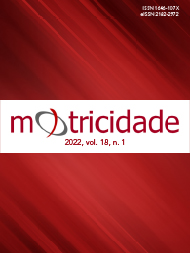The Prevalence and Association of Motor Competence with Weight Status and Bullying: A Cross-Cultural Study
DOI:
https://doi.org/10.6063/motricidade.19752Palavras-chave:
motor skills, body composition, peer relationships, schoolResumo
The purpose of this study was to compare the prevalence of motor competence among children and adolescents from two metropolitan cities, one in Portugal and one in Brazil, and analyzed the association between motor competence and weight status and bullying roles. A Cross-sectional and cross-cultural study was applied. The sample comprised 785 children and adolescents aged 7-14. Motor competence was assessed using The Körperkoordinationtest Für Kinder (KTK) test, while participation in bullying was assessed using a sociometric test and the students’ Body Mass Index (BMI), which was calculated from height and weight and reported as kg/m2. Portuguese students had a higher prevalence of impairment/disturbance in motor coordination. Also, obese students and bullying victims had higher odds of having a motor competence below normal values in both countries. These findings provide evidence of a link between motor competence and sex and weight status of schoolchildren and suggest that motor competence is associated with bullying roles.
Keywords: motor skills; body composition; peer relationships; school
Downloads
Publicado
Edição
Secção
Licença
Os autores dos manuscritos submetidos para publicação deverão ceder, a título integral e permanente, os direitos de autor (copyright) à revista Motricidade e às Edições Desafio Singular. A cedência de direitos de autor permite a publicação e divulgação do artigo em formato impresso ou eletrónico e entrará em vigor a partir da data de aceitação do manuscrito. Os autores concedem, ainda, os direitos para a revista Motricidade utilizar e explorar o respetivo artigo, nomeadamente para licenciar, ceder ou vender o seu conteúdo a bases de resumos/indexação ou outras entidades.
Nos termos da licença “Creative Commons”, os autores poderão reproduzir um número razoável de exemplares para uso pessoal ou profissional, mas sem fins comerciais. Nos termos da licença SHERPA/RoMEO, os autores poderão, ainda, disponibilizar/arquivar uma cópia digital final (versão postprint) do artigo no seu website ou no repositório científico da sua instituição.

